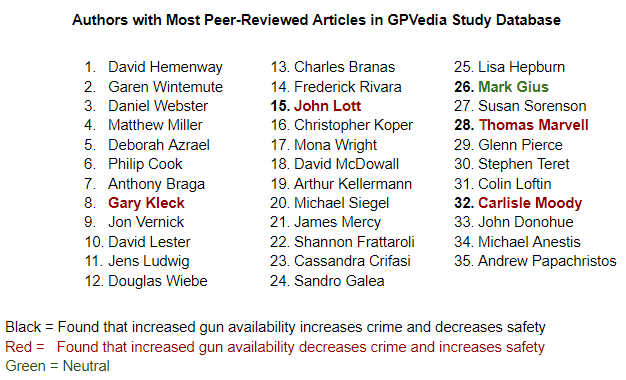Myth-Busting Monday
John Lott’s survey of researchers is the largest of its kind, and shows most experts believe guns make people safer
This article was originally published on GVPedia.
Summary:
Based on his own survey of 120 researchers, researcher John Lott claims that most academics believe private gun ownership makes people safer and that eliminating gun-free zones would save lives.
Lott claims his survey of experts was the largest of its type ever conducted.
The Harvard Injury Control Research Center conducted larger surveys and a majority of experts concluded or agreed that a gun in the home increases the risk of suicide and more permissive concealed carry laws don’t save lives.
Lott’s survey results are skewed because he included old articles, used biased search terms like “gun control,” and included economists and criminologists who are not experts on the topic but share his political views. Lott excluded published experts.
Of the 35 researchers with the most peer-reviewed articles in GVPedia’s study database, only four have written articles consistently finding that gun control policies do not reduce violence: John Lott, Gary Kleck, Thomas Marvell, and Carlisle Moody.
Lott’s Claim:
In his September 18, 2019 testimony before Congress, Lott claims, “Academic researchers broadly think that eliminating gun-free zones is a promising policy change that could save lives. Criminologists and economists are the most interested in that solution, while public health researchers tend to favor traditional gun control methods.” Lott included a chart from a survey of researchers and claimed, “The survey was the largest yet conducted, with a response rate of over 43%, or 120, from the 277 researchers.”
Lott’s written Congressional testimony fails to mention that the survey of criminologists, economists, and public health researchers was conducted by Arthur Berg, Gary Mauser, and Lott himself. The survey was conducted during February and March of 2019, and the resulting survey data was included in a paper published by Lott, et al, in the Winter 2019 journal, Regulation, a journal published by the CATO Institute, a libertarian think tank.
Lott prefaces the Regulation article by discussing a pair of articles appearing in the New York Times in 2017 which surveyed a panel of 32 experts about the effectiveness of a variety of policies at preventing firearm homicides and mass shootings.
Out of the 32 experts in criminology, economics, and public health interviewed for the New York Times story, only five said they opposed gun control policies.
Lott’s 2019 survey asked 32 economists, 38 criminologists, and 50 public health researchers to assess the effect of certain gun policies on mass public shootings and murder rates. The public health researchers who were included in the survey “published at least one English-language empirical study on firearms in a peer-reviewed academic journal between January, 2000 and December, 2018.” The criminologists and economists surveyed were drawn from a 2016 survey, the results of which were published in the Summer, 2016 and “they had to have published at least one empirical study on firearms and violence in a peer-reviewed criminology journal (excluding forensics or injury publications) between January, 2000 and December, 2014.”
The previous survey was conducted between 2014 and 2015 by John Lott and Gary Mauser and published in Regulation in 2016. The survey included 35 economists and 39 criminologists. Lott and Mauser said “economists from both the United States and Canada overwhelmingly believe that private gun ownership makes people safer.”
The authors explain that criminologists surveyed were largely split on the gun policies discussed. Lott and Mauser argue that “researchers, as a group, believe that guns are used more in self-defense than in crime; gun-free zones attract criminals; guns in the home do not increase the risk of suicide; concealed handgun permit holders are much more law abiding than the typical American; and that permitted concealed handguns lower the murder rate.” Lott summarizes the study in similar terms in his 2016 book, The War on Guns.
While discussing the survey results in his 2020 book, Gun Control Myths, Lott highlights how “criminologists and economists evaluated the New York Times proposals as being much less effective than did the public health researchers.” Lott claims the New York Times results favored gun control policies because of “a heavy reliance on public health researchers.” Lott discounts the quality of public health researchers and questions their motives because they believe in preventing violence, not just measuring it.
The Facts:
Lott’s survey of experts is not the largest of its kind.
A May 2014 Harvard Injury Control Research Center survey about firearms and suicide was completed by 150 firearms researchers, including Lott. In contrast to Lott’s survey of 120 academics, 84% of respondents to the Harvard survey agreed that having a gun in the home increases the risk of suicide. A July, 2014 follow-up survey about concealed carry laws was completed by 140 researchers, with a majority believing more permissive concealed carry laws have not reduced crime rates. In subsequent follow-up surveys, a similar or greater number of researchers completed the questions than participated in the Lott survey. Furthermore, the Harvard study found much greater support for gun violence prevention policies than Lott’s study.
Lott’s survey results are more pro-gun than the New York Times and Harvard surveys because he and Mauser use dubious search terms to define their sample. The economists Lott surveyed were found by searching JSTOR for the term “gun control,” which is not a neutral term and primarily used by advocates of weaker gun laws.
A more representative sample of researchers studying the relationship between gun ownership and crime could have been found by searching JSTOR for “guns” and “crime.” For example, the sample of public health researchers was created by searching PubMed for the terms “firearms,” “violence,” “clinical trial,” “study,” “comparative study,” and “journal article.” This might help explain why the views of the public health researchers were more consistent with other surveys of experts than Lott’s surveys of economists and criminologists.
The sample of economists includes scholars who published as early as January, 1997, the same month Lott’s major article about concealed carry was published. Lott included the views of economists who wrote one article about gun violence nearly two decades prior to the study, but excluded other researchers with more recent publications that fell outside the “gun control” search term.
The long window (from 1997 to 2013) allows Lott to include all of his own studies, but excludes economists who published studies finding that gun ownership is a risk factor for murder and suicide.
An impact of Lott’s time frame and search term is that it includes ten articles that appeared in a 2001 issue of the Journal of Law & Economics (JLE). This special JLE issue featured pro-gun articles presented at a conference sponsored by the conservative think tank American Enteprise Institute (AEI) and organized by Lott while he was an AEI resident scholar.
Lott’s sample of criminologists is problematic. Unlike the sample of economists and public health researchers, the authors do not disclose which search terms they used. Lott says, “A total of 80 articles were identified” by 80 different criminologists after searching peer-reviewed criminology journals for articles about firearms and violence between January, 2000 and December, 2013.
Lott implies only 80 peer-reviewed articles about gun violence by 80 criminologists were found, but a simple database search during those 14 years will yield hundreds of hits. Only 39 criminologists responded to his survey and top firearm researchers who have been published in criminology journals during this period were not sampled by Lott and Mauser.
GVPedia maintains the largest publicly available database of gun violence studies with 1,118 studies as of December, 2020. GVPedia’s study database includes 35 researchers who have published ten or more peer-reviewed studies about gun violence.
Only four of the 35 (11%) researchers wrote articles consistently concluding that gun control laws do not reduce violence: John Lott, Gary Kleck, Thomas Marvell, and Carlisle Moody. In contrast, 30 (86%) researchers generally found that gun ownership does not make people safer.
We classified the remaining researcher, Mark Gius, as neutral because his findings do not consistently fall on either side of the gun debate. This unscientific review of the most published researchers on gun violence supports the findings of the Harvard and New York Times surveys, but not the Lott survey.
Sources:






